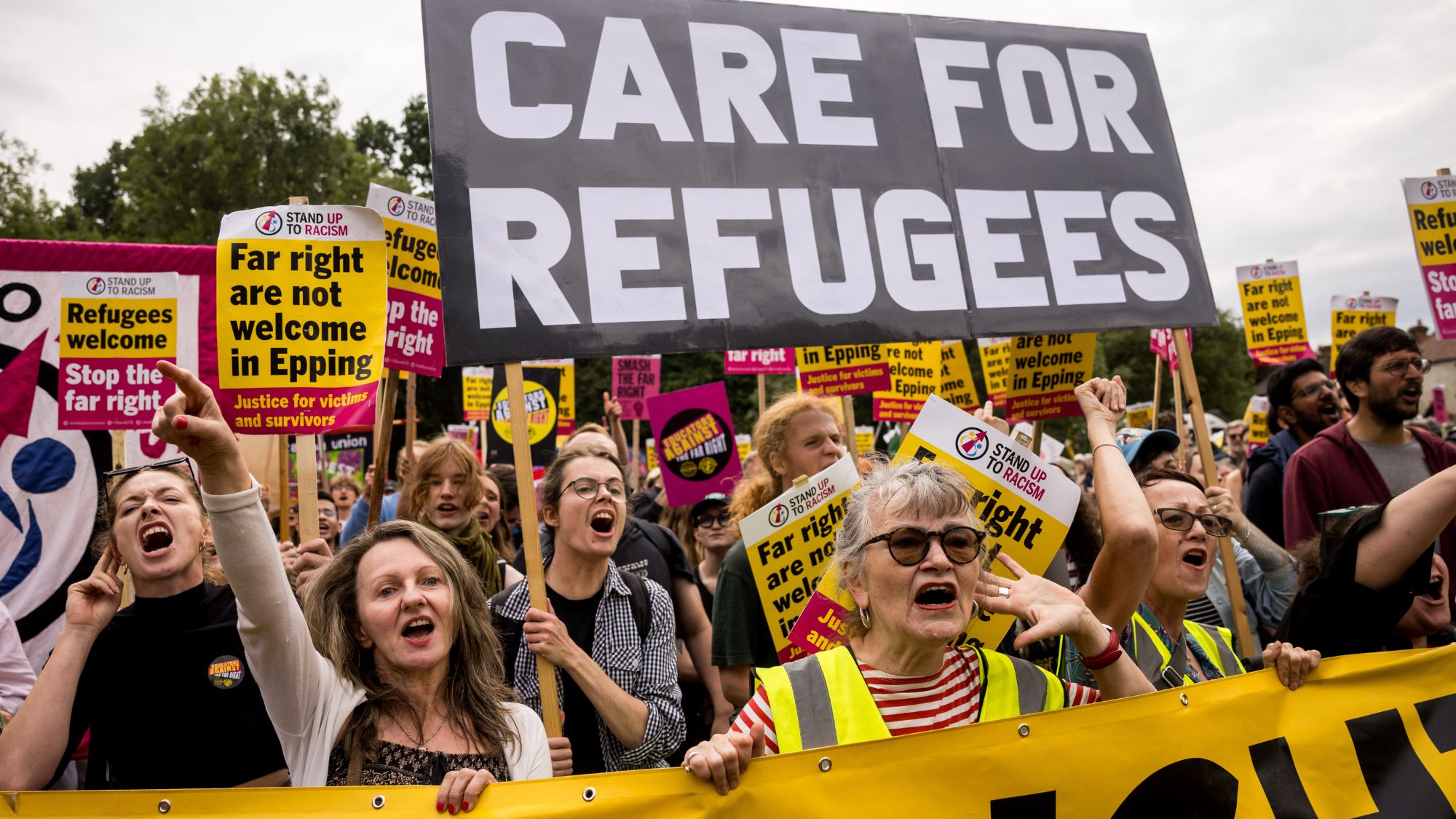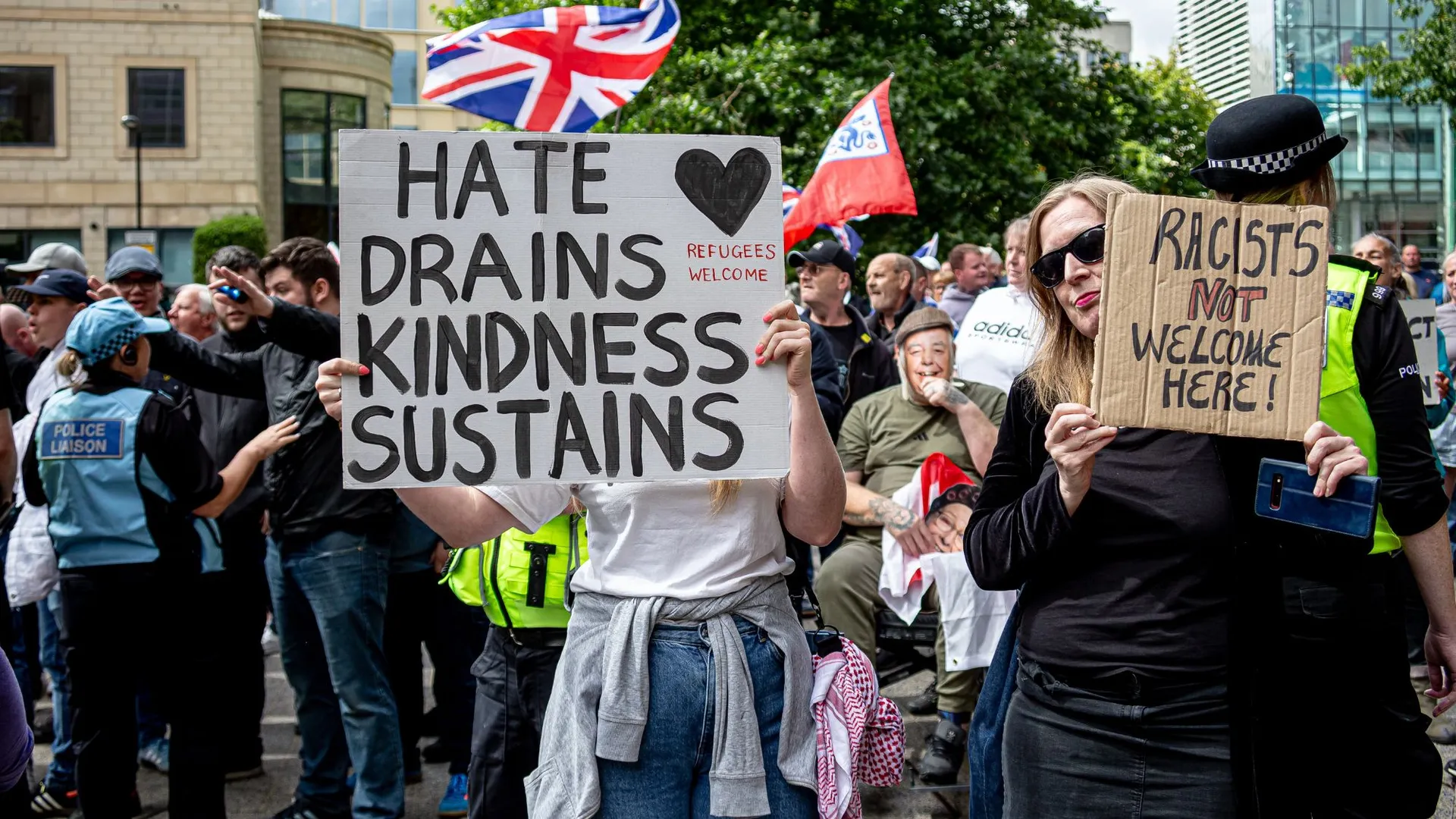From Dog Whistles to Disinformation, How the Far Right Is Spreading Anti-Immigration Narratives
We’ve debunked the common myths around immigration


You might’ve noticed a new (albeit old) feature in your town or village. Up and down the country, Union Jacks and St George’s flags have been hoisted onto lampposts, motorway bridges, and places of worship. For some, they’re symbols of pride. For others, they make a different statement. And, as anti-immigration protests gather pace, often fuelled by misinformation and fear, the far right is finding new momentum—and visibility—on British streets.
Against a backdrop of cost-of-living pressures, political polarisation, and record levels of global displacement, immigration has become one of the most politicised issues of our time.
In the UK, false or misleading claims circulate widely — from suggestions that asylum seekers are being housed at public expense in luxury hotels, to assertions that immigration drives inflation and unemployment. But the facts tell a different story. According to the UK Parliament, most hotel use stems from Home Office delays, not special treatment. Economic studies have shown that immigration tends to have a neutral or even positive impact on employment and growth.

Concerns about violence against women and girls have been co-opted to fuel anti-immigration rhetoric, sparking protests across the country. In response, Stand Up To Racism—joined by public figures including Paloma Faith, Charlotte Church, and MPs Zarah Sultana, Diane Abbott, Bell Ribeiro-Addy, and Nadia Whittome—signed an open letter rejecting attempts to link women’s safety to anti-migrant campaigns.
The far right’s strategy is rarely based on outright falsehoods, and more often, it relies on selective truths, exaggerated claims, and context-stripped data. Isolated crimes are presented as representative of entire communities, while broader social issues such as housing shortages or NHS pressures are framed almost exclusively as consequences of immigration.

Disinformation researchers note that online platforms amplify these narratives, often through coordinated campaigns in which far-right influencers recycle stories across borders. A fabricated report about refugees in Germany, for example, may reappear months later in Italy or the UK with a new local context attached.
Celebrity news, beauty, fashion advice, and fascinating features, delivered straight to your inbox!
These claims, and the emotionally charged language used, can often craft narratives that not only distort reality but also inflame xenophobia, undermine democratic debate, and put migrant communities at risk. They do nothing to make women and girls safer.
Anti-immigration misinformation is not a victimless phenomenon. It directly contributes to hostile environments and hate crimes. This, too, is evident across social media, as you’ll have surely noticed. Blaming immigrants is an easy scapegoat, but do a little digging, and it quickly becomes clear that the most common myths are easily debunked.
Here, with the help of The Institute For Public Policy Research, we dig into the truth behind the lies.
Myth 1: “Immigrants take away jobs.”
- Research shows migration has little impact on wages or job prospects for UK-born workers. In fact, migration can boost overall employment by increasing demand for goods and services. The job market isn’t a fixed pie, adds The Institute For Public Policy Research.
- Many migrants fill roles that are hard to recruit for—especially in sectors like health and social care, where overseas workers are over-represented.
- Recent NHS data shows over 17% of staff in England are from overseas—including 27% of nurses, meaning nearly a third of the NHS nursing workforce is internationally recruited.
- According to the UK permission to work policy, most people seeking asylum in the UK aren’t allowed to work. They can only apply after 12 months—and even then, only for jobs on the limited shortage occupation list, which includes few roles.
Myth 2: “Immigrants are a drain on public services”
- Analysis from the OBR shows that overall the fiscal impact of migration is positive, meaning that migrants contribute more in taxes than they consume in public services.
- Work visa holders pay around £1,900 in fees and £2,600 for the NHS surcharge—plus £800 per person from employers. The OBR estimates this generates £4.1 billion annually.
- Many people in the UK immigration system are barred from accessing welfare benefits due to the “No Recourse to Public Funds” (NRPF) condition.
- At the end of 2024, the Home Office estimated that a total of 3.6 million people held visas that would usually have a 'No recourse to public funds' condition.
- People seeking asylum may have access to accommodation, and limited financial support, but they too have NRPF.
- Economic data shows that allowing people seeking asylum to work could boost the UK economy—raising £1.3 billion in tax, cutting £7 billion in spending, and increasing GDP by £1.6 billion.
Myth 3: “Immigration increases crime.”
- Politicians have been criticised for using selective data to link immigration with crime—skewing public perception. Experts are calling for greater transparency to combat misinformation.
- There’s no clear evidence immigration increases crime due to unclear data on population by nationality and concerns over the Ministry of Justice’s data quality.
Myth 4: “Most immigrants come here illegally”
- IPPR data shows most people arriving in the UK by small boats claim asylum on arrival, and UK law prohibits prosecuting asylum seekers for how they enter.
- Between July 2024 and June 2025, 852,000 visas were issued for work, study, family, or humanitarian reasons, according to government data.
- Many seeking sanctuary in the UK use irregular routes due to limited safe options, as asylum claims can’t be made from abroad.
Myth 5: “Refugees should stay in their own countries.
- People become refugees unwillingly, fleeing war and persecution—usually seeking refuge in neighbouring countries while hoping to return home.
- An estimated 70–75% of refugees stay in neighbouring countries—for example, Jordan hosts over 1.3 million Syrian refugees.
Myth 6: “A person can be ‘illegal’”
- People fleeing war or persecution aren’t illegal immigrants—they’re asylum seekers with the right to protection, no matter how they arrive, says Amreen Qureshi, research fellow at IPPR.
- Asylum seekers are forced to leave their homes, belongings, cultures, and families behind through no fault of their own.
- The vast majority of migrants coming to the UK are people who come to work or study or are on a spousal visa. This is not illegal.

Mischa Anouk Smith is the News and Features Editor of Marie Claire UK.
From personal essays to purpose-driven stories, reported studies, and interviews with celebrities like Rosie Huntington-Whiteley and designers including Dries Van Noten, Mischa has been featured in publications such as Refinery29, Stylist and Dazed. Her work explores what it means to be a woman today and sits at the intersection of culture and style. In the spirit of eclecticism, she has also written about NFTs, mental health and the rise of AI bands.